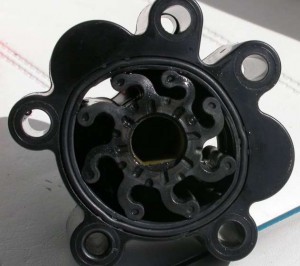Impellers:
Impellers – what they do, why they wear, what can happen when they go out:
Here is a question, what cools your boat motor? Most owners have basic understanding of what cools the engine, but its not a consideration until a problem happens. We encourage a more proactive approach.
An internal combustion engine produces heat – and lots of it. Cars have closed systems with anti-freeze and need very little maintenance. Boats on the other hand draw water to the motor from the lake or river. There are just a few boats with “closed” cooling systems, but even these require water to cool the “radiator” (heat exchanger) and the exhaust system.
Now we get down to the real issue! The sea water pump, AKA raw water pump. Most of these pumps use a small rubber veined “impeller” to suck water from the lake to the engine and the “recirculating pump then circulates water through the engine block and is expelled through the exhaust and there fore cooling the “hot” exhaust system. These small impellers must be flexible in order to have the power to suck water from the river and push it up to the engine. And by engine I mean outboard, inboard, stern drive, I/O and v-drives. Most motor manufactures recommend replacing the “impeller” as an annual preventive measure. Some of these rubber impellers will indeed last two or three years, but why take a chance on causing permanent damage to your motor?
Why and how do these pumps fail? Like the tires on your car, these impellers are rubber and will wear, get hard with age and eventually crack. When the impeller is installed in the pump housing it is squeezed in tight and now becomes bent in order to cause a seal and suction to pull water into the pump housing. Over time it takes this shape and no longer flexes as it rotates inside the pump. Once the impeller takes a “set” (bent) it begins to lose its ability to pull water into the pump and begins to overheat the impeller/pump.
Once a pump has failed, the motor is still running but there is no water running through it to keep it cool. The exhaust is beginning to get very hot and the oil in the engine will no longer be able to lubricate the moving parts. I mean really hot and all of the rubber exhaust hoses, bellows etc. are starting to burn. Next the block gets hot and before you know what has happened, the head(s) warp, head gasket(s) burn through, and the block may likely crack. This means total engine failure, which could have been prevented with a little annual service.
Many shops will only address this issue once you tell them that the motor is running hot or your motor quit. But in reality, damage is being done when this has happened. We recommend annual impeller replacement as a small investment to keep you on the water for years to come!
